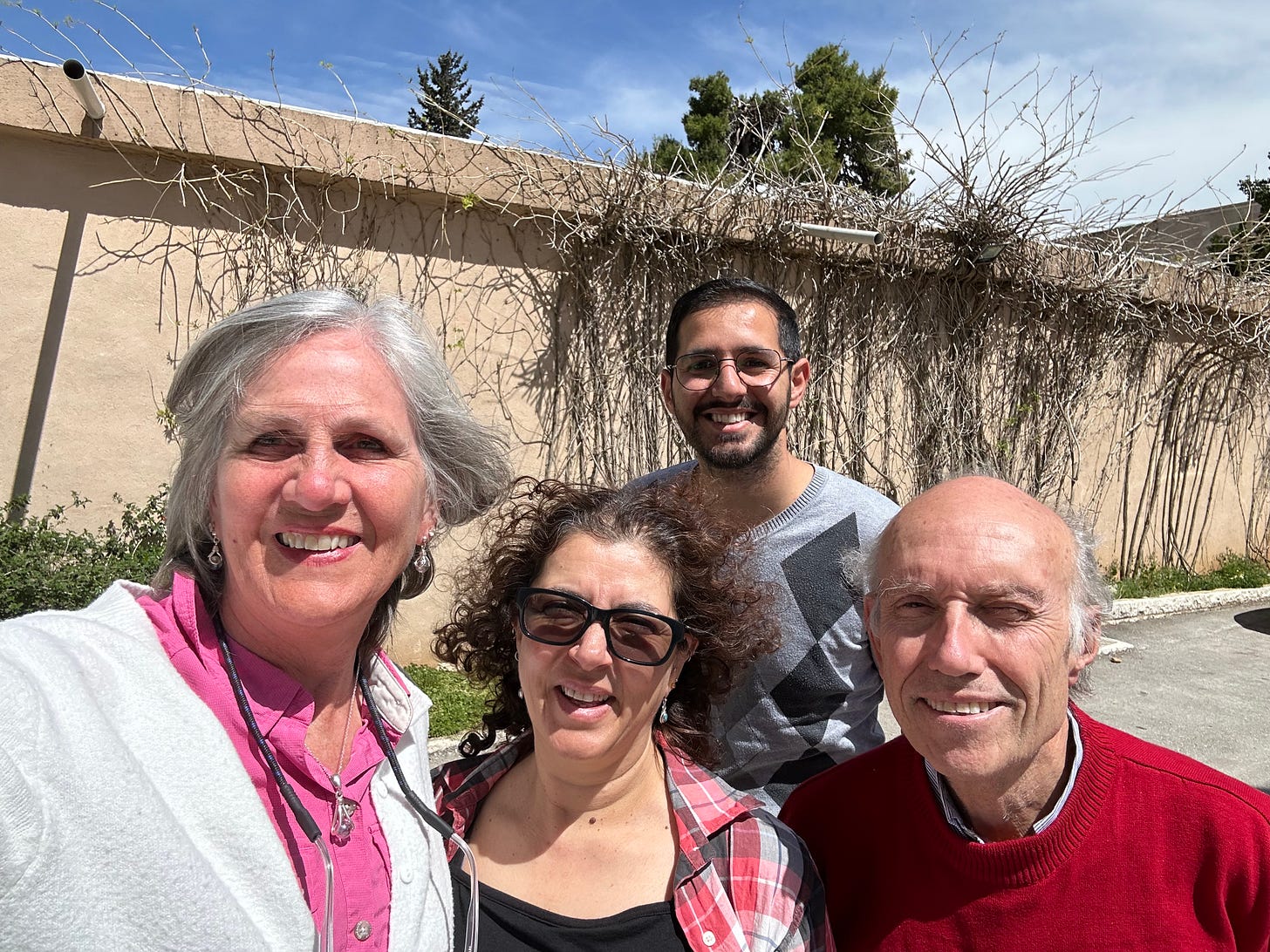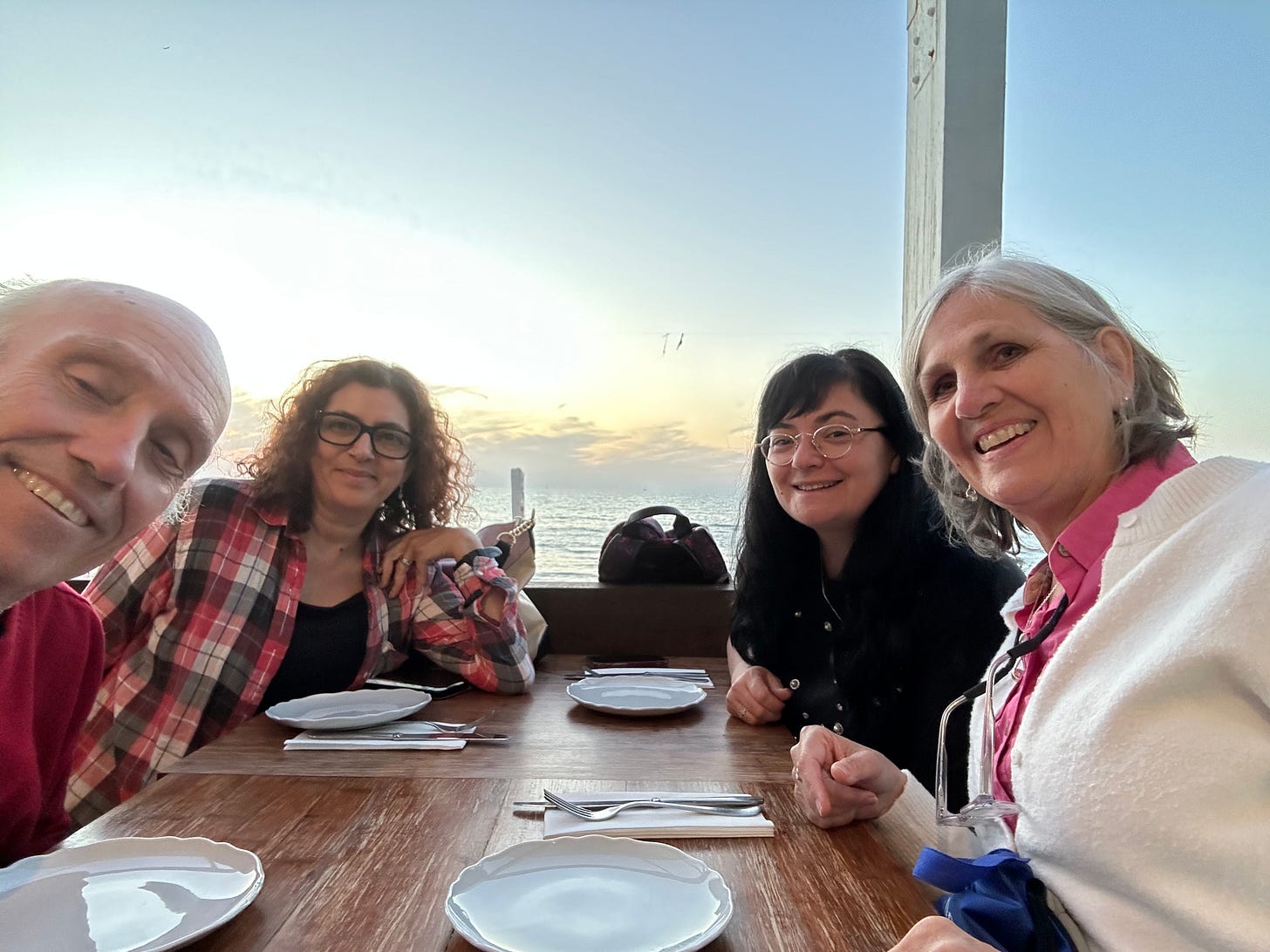Day 4: Crossing Borders and Building Connections
This journal is part of a series written by Norbert Goldfield, Executive Director of Healing Across the Divides, during his trip to Israel and Palestine. Documenting the organization's efforts to promote health and resilience amid conflict, the series offers personal reflections and moments of connection along the way. You can catch up on the first three entries from this trip, available now on Substack.
Refugee camps have no breathing space. The streets are very narrow. There are obviously no spaces for children to play, for couples to walk hand in hand. We were surprised but pleased that an organization submitted a grant proposal for rooftop gardens in refugee camps to improve nutrition and provide desperately needed greenery.
But first a quick couple of stories on how I got to Ramallah from Jerusalem that morning on my way to Lions Square in Ramallah to meet up with Nehad. On this day, the Israeli army did not allow any buses to go directly between the two cities. Instead I got off at the Qalandiya checkpoint, and walked the narrow maze to the other side. To be sure that I was going the right direction I asked a young man for the way. He turned out to be a medical student and we had a whole conversation and got onto the same minibus on the Palestinian side of the checkpoint. Once I got on the bus, an elderly gentleman asked if I wouldn’t mind sitting in a different seat so he and his wife could sit together – and he turned out to be a retired Palestinian surgeon who had worked all his professional life in the U.K.! What a way to start my morning! I waited for Nehad at Lions Square.
In Israel there are reminders of the hostages everywhere. Unlike last year, there are no reminders in Lions Square or elsewhere that I saw in my travels on Day 4 in Ramallah of the 14,500 children killed in Gaza; 25,000 children injured, resulting in the highest number of child amputees per capita in the world. Over 17,000 children were separated from their parents. I am not sure why these memorials are absent, unlike last year, from the Palestinian visual landscape in Ramallah.
Nehad picked me up at Lions Square, and we made our way to the offices of Caira (which means best, prime, beautiful, radiant in Arabic), the grantee pursuing rooftop gardens. Eight young people under 30 created this organization in response to their feeling that most Palestinian NGOs were dominated by older generations. Sound familiar for those of us operating in an American context? We met with Anton (see the photograph) and Sondos, two of the group leaders. They explained their first obstacle in trying to establish rooftop gardens in Palestinian refugee camps. Their initial site, a camp in Jenin, is being destroyed by the Israeli army. For now, Caira will switch the project from Jenin to Jalazone (see the photograph) on the outskirts of Ramallah. They are just beginning the first year of their three-year grant.
In contrast, Palestine Sports for Life (PS4L) is in its last year of HATD's grant. They have accomplished all their objectives of improving nutrition and well-being for more than 1,000 young teenage girls and their mothers during the first two years. Researchers on HATD's board are working closely with PS4L to scientifically document their impact. They are using validated questionnaires in two camps, with one receiving the intervention and another serving as the control group. They hope positive results, combined with an accompanying scientific article, will bolster their marketing efforts and attract further funding. Unfortunately, many Palestinian NGOs are currently facing significant challenges in fundraising. Anecdotally, there seems to be growing anti-Palestinian sentiment among funders.
After that sobering yet inspiring meeting, Nehad, Jennal, and I took a circuitous route in Nehad’s car to cross into Israel. This meant navigating roads interrupted by numerous gates set up by the Israeli army. Eventually, we arrived at our final grantee meeting for the day with Elifelet in Tel Aviv. This new grantee works completely outside of the Israeli-Palestinian conflict. Healing Across the Divides has long supported one grantee focused on African Refugee Asylum Seekers (RAS), a group that originally numbered 80,000 but now totals approximately 30,000. These individuals are denied rights in Israel, live in cramped conditions, and send 98% of their children to segregated schools in some of Tel Aviv's most dilapidated areas. Elifelet’s intervention is based at this school, focusing on pre-teen and adolescent sexuality using a standardized curriculum, along with a Big Sisters mentorship program. Their work is still in its initial stages.
One of the highlights of these trips is spending quality time with our talented staff and treating them to a nice dinner (see the photo). Sadly, Tova Reznicek, our communications director, couldn’t join us as she was delayed at checkpoints in Nablus due to her other job. For the rest of us, including Jennal Johnson, the president of our board, the evening was a wonderful and well-deserved reprieve!






